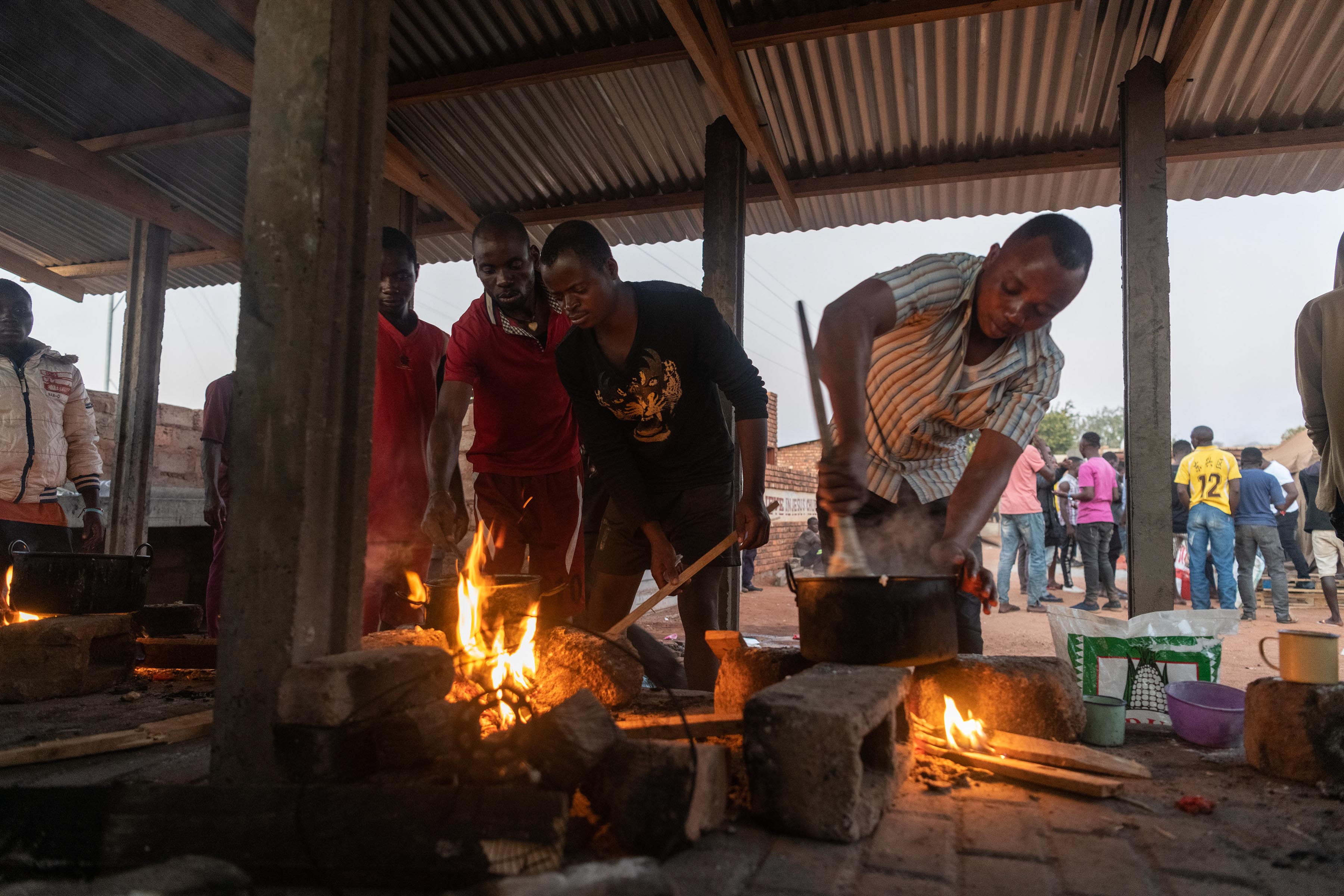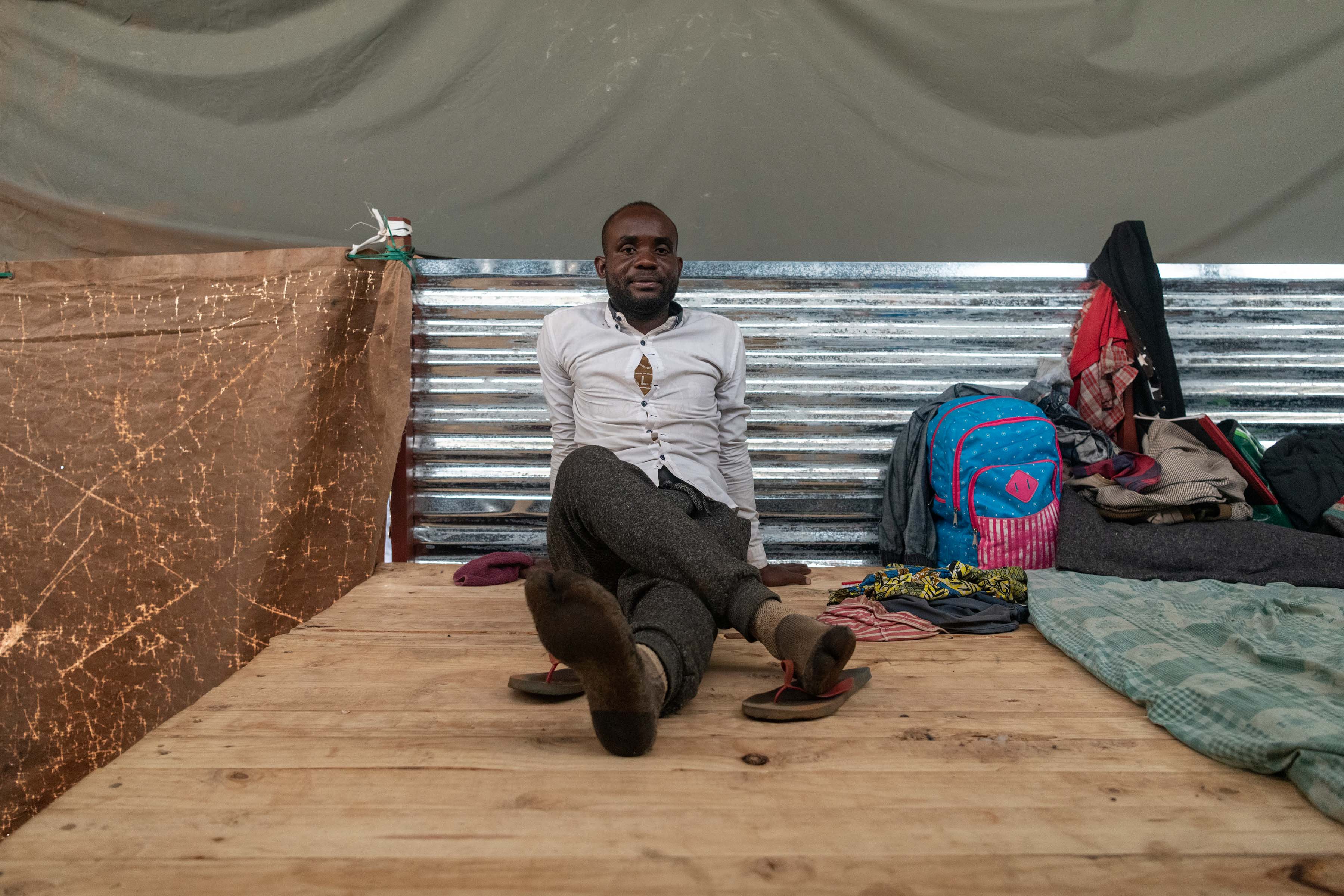Asylum seeker hopefuls languish in Limpopo
An almost 100% rejection rate at the Musina Refugee Reception Office means people fleeing violence are left stranded, neither able to earn money nor return home.
Author:
16 August 2019

Emmanuel Kwigomba Cirhakarhula, 23, doesn’t know what happened to his mother.
He was forced to flee his village outside Bakavu on the south-western edge of Lake Kivu in the Democratic Republic of the Congo when it was attacked by rebels earlier this year.
Cirhakarhula’s uncle was killed in the attack. When it finally ceased and the rebels fled, he was able to check on his mother. She was shot, with blood pooling next to her, but insisted Cirhakarhula flee the village. She told him to take what money they had – about R750 – and run.
Related article:
He arrived in Musina in Limpopo in July this year, reporting to the Department of Home Affairs and indicating that he wanted to apply for asylum.
“I don’t have a cellphone anymore. I don’t know if she’s alive,” Cirhakarhula said. “I always pray for her. I didn’t get to bury my uncle, and I don’t know if she’s alive.”
“It’s crazy how my life changed. My mother said I must run away. She said, ‘Don’t worry about me’. She gave me money and said run,” he said. “I think about her a lot.”

Cirhakarhula was standing in the dusty compound of the I Believe in Jesus Church in Nancefield-Messina, a township outside Musina, where he has been living for the past few weeks.
At the time, he was one of more than 750 men, mostly asylum seekers from the Democratic Republic of the Congo, Burundi and Zimbabwe, living in basic shelters built from corrugated iron. Conditions are rough with a shortage of showers and cooking space.
The men are allowed to stay at the shelter until their asylum applications have been completed and they receive the permits. Some of the men sleep in a big tent and others on the floor or on wooden structures housed in the corrugated iron shelters.
Despite the hospitality of Bishop Simon Sithole, who said it was his duty to help these men, asylum or refugee status is guaranteed for none of them. And they can’t stay indefinitely.

Rejected applications
Unsuccessful asylum seeker applicants, institutions providing legal assistance to applicants, and organisations such as Lawyers for Human Rights (LHR) have accused officials at the Musina Refugee Reception Office (RRO) of “summarily rejecting” asylum applicants.
Sharon Ekambaram, the programme manager for LHR’s Refugee and Migrant Rights Programme, said the Musina RRO has had close to a 100% rejection rate for refugee applicants since 2016.
Statistics provided by home affairs showed it only approved 14 applications in 2017, one the year prior, zero in 2015 and 2014, and only two in 2013 despite thousands of applications.
In comparison, the Desmond Tutu Refugee Reception Office in Pretoria approved 1 610 asylum applicants in 2017, 1 219 in 2016, 2 100 in 2015 and 4 468 in 2013. The department didn’t provide statistical information for 2014.
Related article:
In a situational report by LHR in 2017, the organisation wrote: “For the whole of 2017, the office has not come across anyone with a recognised Refugee status (Section 24) that was issued in Musina.
“It is well documented that the norm or rule in Musina Refugee Reception for over a year or more now, is that anyone who attempts to apply for asylum is summarily rejected.
“The procedure is for the person to file an Appeal Notice immediately, and failure to do so means that they will not receive a temporary asylum seeker permit.”
Departmental spokesperson David Hlabane was unable to provide updated statistics or dispute the high rate of rejections despite having more than three weeks to answer questions. Asked when he could provide statistics, he replied that they were “being processed”.

Further accusations against officials at the Musina RRO include widespread duplication of the reasons for rejecting asylum applicants’ application reports. But Hlabane denied this.
“This is not true. Each case is dealt with on its merits,” he said. Asked whether any officials had been accused of or investigated for the copy-and-paste jobs on reports, he said: “Since the allegation is unfounded, there is no official charged [with] misconduct.”
Asked to explain why the Musina RRO had such low numbers for approving applications despite having more than 9 000 applications in the year it didn’t approve any applications, and 13 622 in another, Hlabane said: “Approval depends on the claim made, and each claim is dealt with based on its merit.”
Cirhakarhula arrived in South Africa on 1 July 2019, and got an appointment for his asylum application only on 23 July. Officials took his biometric data and asked him to return on 1 October for the first of a number of rounds of interviews to determine whether he was a legitimate asylum seeker or not.
He might still get rejected.

No money
In the meantime, he walks around the township vulnerable to arrest and exploitation because he is not documented, and not permitted to work. His money ran out before he even arrived at the shelter.
“I don’t have any money, I don’t have anything,” he said. “Here people share food. We eat in a group but yesterday I didn’t eat and until now I haven’t eaten. I didn’t have money to contribute. It’s difficult. For me to be helped, I must have a document,” he said, referring to his desperation to be approved for asylum. “It’s very difficult to get help without it.”
Related article:
James Chirwa, a project manager at the Messina Legal Advice Office that provides legal advice to asylum seekers, said he believed the Department of Home Affairs issued asylum seeker permits instead of refugee permits in the hope that migrants would return to their own countries. But even then, he said, the department used any possible reason to reject an application.
“You wouldn’t really understand their thinking,” he said. “The statistics, 100% rejection, it doesn’t make sense. Obviously, there are [people from] countries who are deserving. But even if they gave them refugee status, when their countries of origin political situation has stabilised, they will go back home. It doesn’t mean they will be here forever.

“You really don’t understand how they apply the law and how they operate. So it is a bit of a challenge when it comes to that,” he said. “As an organisation we have been writing appeals on ‘manifestly unfounded’ and ‘unfounded’.” These are two of the most common reasons given to reject applications.
Chirwa said despite the high number of rejections and appeals to be written, the organisation had to limit its numbers because of dwindling resources. Director of the legal advice office Jacob Matakanye said there was no doubt in his mind that the reasons were copied and pasted across asylum applications.
“That is what’s happening. It is not a rumour. When you read one decision and another decision, it is the same as each other,” he said. “Everyone who is applying, they are the same. But now that is not true.”

Waiting and hoping
Israel Mangane, 23, was an exception at the men’s shelter at I Believe in Jesus Church in Nancefield-Messina. He arrived in South Africa on 1 July after fleeing violence in Goma in the DRC. Fourteen days later he was granted asylum.
“I’m here because on 15 May this year the rebels came to take people in my village and force them to join the rebels,” he said. “I ran away the moment I got a chance.”
Mangane said before he managed to escape Goma, he was beaten by rebels. He travelled on the back of a truck to South Africa and was taken to a hospital after he presented himself to the Musina RRO.
“My mind was like a crazy man. Even now I can’t sleep,” he said. “They killed many people in my village. I’m not feeling well because of it.”
Related article:
Mangane said he had been able to get in touch with his family since his arrival in South Africa. “My family was safe. I can’t go back because my life is in danger. I can’t go back because they will kill me,” he said.
He hoped his asylum permit, which was only valid for one month before it needed to be renewed again, would be changed to a refugee permit. “I want to go to UCT [University of Cape Town]. I want to be a doctor one day,” he said.
Papitcho Chahe Wembolva, 36, said he was constantly rebuffed at the Musina Refugee Reception Office when he first arrived in South Africa. “I wanted to declare I am a refugee from Congo. I went there one week, two week. I don’t know how many times I went,” he said.
Wembolva said he finally secured an appointment to do his biometrics after three weeks, and was then told to come back at a later date. While he waits to finalise his asylum application, he will remain at the shelter, struggling for each meal as his money runs out.





